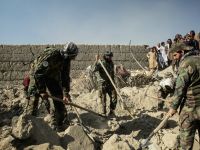President Alberto Fujimori's decision to call new elections and not to run as a candidate caused confusion in Lima Sunday, as analysts sought to understand the constitutional implications of his announcement.
In an unexpected move late Saturday, Fujimori announced Peru would hold a new general election, after his government was compromised by a controversial video showing Peru's secret service chief bribing a lawmaker.
Although he said he would not present his candidacy for the election, Fujimori gave no details on the date of the upcoming election or how soon he would leave office.
Fujimori had said he would also now disband the intelligence service.
While implying with his announcement he would step down, Fujimori nonetheless has so far failed to do so officially.
Opposition members began to express some concern over Fujimori's intentions Sunday, citing the president's tenacity in retaining power since he first took office in 1990.
Fujimori can resign as president but does not have the powers necessary to dissolve Peru's single-chamber 120-member parliament, according to constitutionalists.
For this to be possible, a government censure by Congress must take place on two consecutive occasions, the constitutionalists said.
Voices from the opposition called for Fujimori to quit immediately and to let vice president Francisco Tudela, a moderate conservative and former Peruvian foreign minister, preside in the interim.
Some people, however, want to see a new interim government to oversee the transition and ensure conditions are met for "fair and transparent" elections.
One candidate has already presented his candidacy for the next election.
Fernando Olivera Vega, 42, leader of the smaller opposition party the Moralizing Independent Front (FIM) -- which was responsible for releasing the bribe video to the public -- has announced he will run.
In what was seen as a tacit support for Fujimori during the last election, Olivera Vega had abstained from presenting his candidacy.
However, by doing so this time, he will challenge the request by Peru Possible party leader Alejandro Toledo -- who hotly contested the Fujimori bid at the last round -- that only one opposition candidate run.
Meanwhile, nothing has been seen or heard of National Intelligence Service (SIN) chief Vladimiro Montesinos, who was filmed in the 58-minute video giving a bribe to former Peru Possible member Alberto Kouri.
The content of that video, released late Thursday, implied that the 15,000 dollars Montesinos gave to Kouri was a bribe for him to switch to Fujimori's party -- which Kouri did shortly after Peru's second round election.
Fujimori's Peru 2000 party, in fact, was only able to register a majority in parliament after the defection of a number of opposition deputies.
Another major element of support for Fujimori throughout his 10 years in government -- the Peruvian army -- has also failed to comment on events of the last few days.
According to a report in the US daily the Miami Herald, Fujimori's decision to step down was a bid to prevent the release of additional explosive and potentially videos.
The daily, citing Peruvian sources Sunday, said at least two videos taped by Montesinos' agents and have not yet been leaked to the media -- LIMA (AFP)
© 1969 Al Bawaba (www.albawaba.com)







